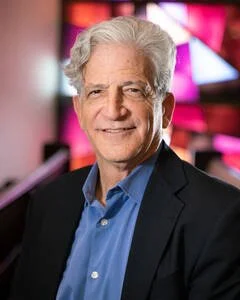
Rabbi Thomas A. Louchheim
-
Thomas Alan Louchheim was born on February 9, 1957, in Los Angeles, California, the third child of Sandy z”l and Marlene Louchheim. He graduated Georgetown University in Washington, D.C., where he received a Bachelor of Arts in Business Administration and Finance in 1979.
Tom remained in Washington, where he worked for Rabbi David Saperstein at the Religious Action Center and was a chef in a local Georgetown restaurant. In 1981 he was accepted into the Rabbinic Studies Program of Hebrew Union College-Jewish Institute of Religion (HUC-JIR). He received a Master of Arts in Hebrew Letters in 1984 at HUC-JIR, Los Angeles, and a certificate of Para-Chaplaincy from the Board of Jewish Rabbis of Southern California.
Tom met his wife, Marcia Rich, in Israel, where they both studied to become Jewish professionals. The couple was married in 1984 and moved to Cincinnati, where Tom was ordained in May 1987.
Rabbi Louchheim accepted his first rabbinic position as Assistant Rabbi at Congregation B’nai Jehudah in Kansas City, a large Reform Jewish congregation of some 2,000 families, where Marcia taught religious school. Their first child, Katie Jean, was born there in November 1987. In 1989, the Louchheims moved to Tucson, where Tom served as Assistant Rabbi to Rabbi Joseph Weizenbaum at Temple Emanu-El. His family flourished in Tucson with the arrival of their second child, Jacob, in June 1990 … their third child, Daniel, in June 1993 … and their fourth child, Benjamin, in April 1996. Tom became the Rabbi at Temple Emanu-El after Rabbi Weizenbaum departed. Rabbi Louchheim left in 1994 to serve as Chaplain and Volunteer Coordinator at the Jacob C. Fruchthendler Hospice at Handmaker.
In the summer of 1995, Louchheim was approached by twelve families who hoped he would agree to be the rabbi of a small Reform Jewish congregation. Thus, was born Congregation Or Chadash (New Light), named and blessed by Tom and Marcia, who served as its first Director of Education, and the congregation grew and flourished under their leadership. In that first year, an opportunity arose for Or Chadash to establish itself in the original Temple Emanu-El location on Stone Avenue. Rabbi Louchheim gathered members of the community to raise funds for that purpose. When it became apparent that the facility would be too small for the congregation’s purposes, they continued raising funds to preserve the property for the Jewish community and a Jewish museum was soon established there.
In 2019, Rabbi Louchheim helped lead the way to the creation of our Kol Ami Synagogue. On Rosh Hashanah 5782 (2022), he became co-Rabbi. The following spring, in a ceremony delayed by the pandemic, he signed the ketubah (marriage contract) before our congregation, officially bringing the marriage metaphor to life and two communities into one. Kol Ami’s success is largely due to his leadership and commitment to the Southern Arizona Jewish community.
Building community is something Tom Louchheim does naturally. He established the first Jewish-Christian-Muslim scripture study group and helped organize Tucson’s annual Jewish-Muslim Peace Walks, which began in response to the tragic events of 9/11. Embracing Tucson’s multi-faith community, Or Chadash became the first Jewish congregation to join Interfaith Community Services (ICS); and Rabbi Louchheim was instrumental in organizing the first “Jewish Build” for Habitat for Humanity, along with Congregation Chaverim. In 2006, he was instrumental in creating “The Interfaith Dialogue: Contemplative Practices for Creating Peace” with the Dalai Lama and 150 clergies from throughout Arizona. Over the years, Louchheim has served on many boards and committees, including the Tucson Board of Rabbis (President), the Central Conference and Pacific Association of Reform Rabbis, Handmaker Hospice Advisory Board, Habitat for Humanity, and as co-chair of the Jewish Federation of Southern Arizona’s Yom HaShoah Committee for 27 years.
-
Rabbi Thomas Louchheim will become Rabbi Emeritus at the end of June 2023, and he should help Rabbi Cohen in the position to which Rabbi Cohen has been elected. He should guide lay people to understand that at that time rabbinic duties and responsibilities is transferred automatically and fully. Rabbi Louchheim as Emeritus also should guide lay people to accept Rabbi Cohen as the incumbent Rabbi shall show Rabbi Cohen all due courtesy. Rabbi Louchheim should refuse to be drawn into questions of congregational policy or into newly established relationships between the incumbent Rabbi and that Rabbi’s congregants, individually or collectively.
The Rabbi Emeritus may sit on the pulpit at any services and at a place of honor at all significant occasions in the life of the congregation and should be so welcomed. The wishes of the Emeritus to do otherwise should be respected.
When invited to do so by the Rabbi of Kol Ami, the Rabbi Emeritus may participate in conducting the synagogue service or may preach. When performing these functions, the Rabbi Emeritus should follow the forms of worship and ritual then prevailing, unless there is agreement otherwise. He may also teach classes from time to time. There will be no remuneration to be paid for serving in this capacity.
The Rabbi Emeritus may officiate at life cycle ceremonies with the agreement of the incumbent Rabbi. In such situations, the Rabbi Emeritus should follow the policies set by the incumbent Rabbi, unless they agree otherwise. For members of Kol Ami, the Rabbi Emeritus will act in his capacity as a member of the synagogue’s clergy and therefore no honorarium be sought from the members.
-
View tributes to the Rabbi here.

